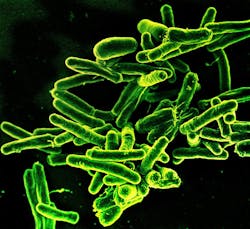A clinical trial testing a freeze-dried, temperature-stable experimental tuberculosis (TB) vaccine in healthy adults found that it was safe and stimulated both antibodies and responses from the cellular arm of the immune system. Results are published in Nature Communications.
The experimental vaccine, ID93+GLA-SE, was developed by Christopher B. Fox, Ph.D., and scientists at the Access to Advanced Health Institute (formerly the Infectious Disease Research Institute) in Seattle. It is a recombinant subunit vaccine made from four proteins of Mycobacterium tuberculosis bacteria combined with GLA-SE, an immune-stimulating adjuvant. The freeze-dried formulation does not require refrigeration and is mixed with sterile water just prior to injection. Thermostable vaccines are desirable in settings where maintaining cold or frozen vaccines for long periods can be costly and difficult.
The current trial investigated whether administering temperature-stable vaccine containing both ID93 and GLA-SE in a single vial would be as effective at inducing an immune response as a regimen in which non-thermostable ID93 and liquid GLA-SE are held in two vials and combined prior to injection. A single-vial presentation of a thermostable vaccine would have clear advantages in ease of storage, transport and administration, the investigators note.
Daniel F. Hoft, M.D., Ph.D., director of the Saint Louis University Center for Vaccine Development, led the single-site trial at the university’s School of Medicine. Twenty-three participants received the thermostable single-vial regimen, while 22 participants received the two-vial, non-thermostable regimen. Both vaccine presentations were safe and well-tolerated. Recipients of the single-vialled thermostable vaccine had robust T-cell responses and produced higher levels of antibodies in the blood than those receiving the non-thermostable two-vial presentation.

